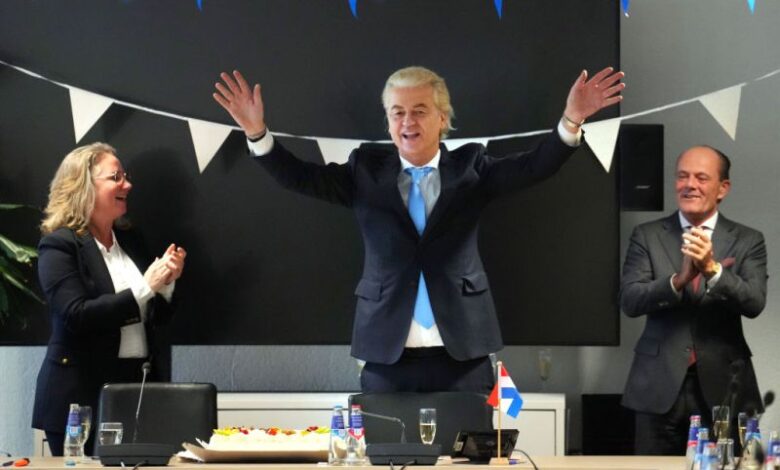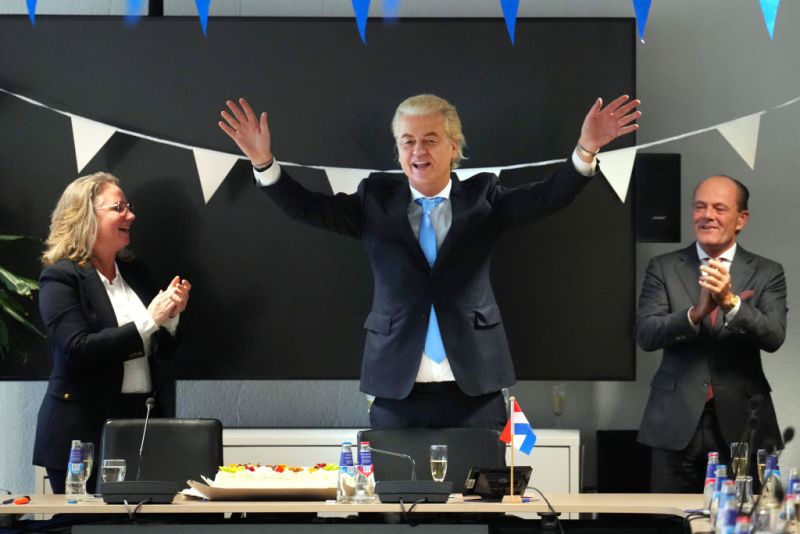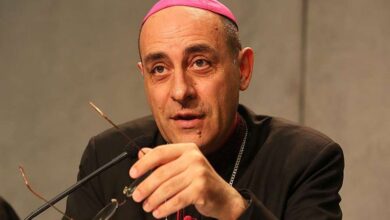Nationalist Firebrand Geert Wilders wins Dutch election in electoral upset

 Geert Wilders, the leader of the Dutch Party for Freedom (PVV), celebrates in his party office after his party's victory in yesterday's general election, on November 23, 2023, in The Hague, Netherlands. The Netherlands' far-right, anti-EU leader Geert Wilders won the most votes in parliamentary elections on November 22, dominated by debate around rising immigration in the Netherlands. / Credit: Carl Court/Getty Images
Geert Wilders, the leader of the Dutch Party for Freedom (PVV), celebrates in his party office after his party's victory in yesterday's general election, on November 23, 2023, in The Hague, Netherlands. The Netherlands' far-right, anti-EU leader Geert Wilders won the most votes in parliamentary elections on November 22, dominated by debate around rising immigration in the Netherlands. / Credit: Carl Court/Getty Images Vatican City, Nov 23, 2023 / 15:30 pm (CNA).
Far-right populist Geert Wilders’ Freedom Party (PVV) dominated the Dutch election on Wednesday in what has been viewed as a seismic political upset. With nearly all the votes counted, the PVV is set to win an unprecedented 37 seats in the Tweede Kamer (lower house), a significant increase from the 17 seats the party held in 2021.
In the Dutch system, a ruling coalition needs 76 of the 150 seats in Parliament. Should Wilders be able form a coalition in the coming weeks, he will become the prime minister.
Born in 1963 to a Catholic family in Venlo, near the German border, Wilders entered politics in 1996 with the center-right People’s Party for Freedom and Democracy (VVD). In 2006 he founded the PVV.
He has long been considered a political outlier for his acerbic style and virulent anti-Islamic views, a religion he has often called “backward” and “an ideology of a retarded culture.” Wilders has called for banning mosques, Islamic schools, and the Quran from the Netherlands.
While the 60-year-old has toned down the rhetoric, the election was in many ways a referendum on immigration and on the acceptance of asylum seekers, which Wilders wants to ban outright and was an issue that led to the outgoing prime minister Mark Rutte’s resignation earlier this year.
During his victory speech on Wednesday night, Wilders vowed to stop what he called the “asylum tsunami.”
“The Dutchman has hope. The hope is that people get their country back. That we make sure that the Netherlands is for the Dutch again,” he continued.
Wilders has been a fixture of the European right, forging close ties with other European nationalists including Marine LePen of France, Matteo Salvini of Italy, and the Prime Minister of Hungary Victor Orban.
On X (formerly Twitter), Orban congratulated Wilders on the party’s victory, writing: “The winds of change are here! Congratulations to @geertwilderspvv on winning the Dutch elections!”
The winds of change are here! Congratulations to @geertwilderspvv on winning the Dutch elections! pic.twitter.com/yh9LVcuP5J
— Orbán Viktor (@PM_ViktorOrban) November 22, 2023
Despite the jubilation of Europe’s populist right, many Catholic leaders have tacitly condemned the growing surge of populism across the continent.
The Catholic bishops of the Netherlands published a comprehensive letter on Nov. 2 that criticized many of the key pillars of Wilders’ political manifesto. Titled “Everyone should be able to participate,” the letter highlighted a myriad of issues ranging from the importance of the common good, human dignity, the right to life, the issues of political indifference, and the urgency to address climate change. The letter also expressed consternation over growing political polarization in the country.
Quoting Pope Francis’ 2020 encyclical on human fraternity, Fratelli Tutti, the Dutch bishops called for a “better” politics that “pursues the common good by recognizing the dignity of every human being and the solidarity we all share.”
The letter went on to note that “such recognition helps politicians find answers to current challenges and in shaping a society in which everyone comes into their own. There is also room for those who come from elsewhere, are in need, and require our care. All people are equal in dignity.”
“We are deeply concerned about growing divisions and increased fears in our country due to conflicts elsewhere in the world, which have as a result that Jews as well as Muslims in our society are unfairly targeted and negatively affected.”
“Common good is promoted not only by connecting people but also by uniting them in common projects such as Europe, which began as a peace project by building trust and cooperation,” the letter continued.
Religion has been in steep decline in the Netherlands for the past two decades. According to a 2021 report by Statistics Netherlands (CBS), over 55% of Dutch do not claim any religious affiliation, while 18.3% identified as Catholic (down from 19.8% in 2020). But, according to the 2020 figures, only 13% of Catholics regularly attend Mass and almost 8% said they do not believe in God.
Earlier this month, the Commission of the Bishops’ Conferences of the European Union (COMECE) issued a statement following their 2023 Autumn Plenary Assembly on the themes of unity and peace. Singed by 21 delegate bishops of the COMECE — including Theodorus C.M. Hoogenboom, the auxiliary bishop of the Archdiocese of Utrecht — it warned that the ongoing conflict in Palestine and war in Ukraine could have a destabilizing effect on the rest of Europe.
“Such international polarization and regional instabilities also have repercussions for European societies, stirring up fears, weakening dialogue, and threatening social cohesion,” the letter stated.
The letter also drew attention, without explicitly mentioning any politician or party by name, to the rightward populist shift that characterized the European political landscape over the last two years.
“Dangerous phenomena have been gaining ground in several European countries, such as antisemitism, radicalization, and xenophobia, often fueled by a systematic spread of disinformation and resulting in violent extremism and terrorism, which we strongly condemn in all their forms and expressions.”





